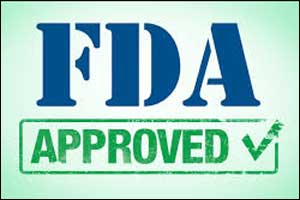- Home
- Editorial
- News
- Practice Guidelines
- Anesthesiology Guidelines
- Cancer Guidelines
- Cardiac Sciences Guidelines
- Critical Care Guidelines
- Dentistry Guidelines
- Dermatology Guidelines
- Diabetes and Endo Guidelines
- Diagnostics Guidelines
- ENT Guidelines
- Featured Practice Guidelines
- Gastroenterology Guidelines
- Geriatrics Guidelines
- Medicine Guidelines
- Nephrology Guidelines
- Neurosciences Guidelines
- Obs and Gynae Guidelines
- Ophthalmology Guidelines
- Orthopaedics Guidelines
- Paediatrics Guidelines
- Psychiatry Guidelines
- Pulmonology Guidelines
- Radiology Guidelines
- Surgery Guidelines
- Urology Guidelines
FDA approves new drug for Pulmonary Multidrug-Resistant TB in children

The drug regulatory body, U.S Food and Drug Administration has recently approved a new drug manufactured by Janssen a unit of Jonson and Jonson, for treatment of pulmonary multidrug-resistant tuberculosis (TB) in children.
Bedaquiline is a diarylquinoline antimycobacterial drug indicated as a part of combination therapy in pediatric patients – those over the age of 12 and younger than 18 and weighing at least 66 pounds (30 kilograms) – with pulmonary multidrug-resistant tuberculosis (MDR-TB), when an effective treatment regimen cannot otherwise be provided.
Approved under the accelerated approval pathway of Food and Drug Administration based on time to sputum culture conversion, bedaquiline can now be used as part of combination therapy for eligible MDR-TB patients aged 12 years and over in the U.S. Continued approval for this indication may be contingent upon verification of clinical benefit in confirmatory trials.
The Food and Drug Administration approval marks the first regulatory milestone as part of the company’s global pediatric research and development (R&D) program for bedaquiline, with additional global regulatory filings planned. Further research is ongoing in children younger than 12 years of age using a pediatric formulation of bedaquiline.
TB is the world’s deadliest infectious disease, claiming 1.6 million lives every year – more than HIV and malaria combined. While TB often affects adults in their most productive years, all age groups are at risk. In 2017, an estimated 1 million children became ill with TB and 230,000 children died of the disease, underscoring the urgent need for effective pediatric TB treatments. Approximately 95% of childhood deaths from TB occur in Asia and sub-Saharan Africa.
“We are proud of what today’s approval means for adolescent patients in the U.S., and we are hopeful about the future of our pediatric R&D program,” said Paul Stoffels, M.D., Vice Chair of the Executive Committee and Chief Scientific Officer, Johnson & Johnson. “Despite being a major global health issue, TB lacks the attention and resources it requires – and the issue of TB in children is even more neglected. At Johnson & Johnson, we are committed to developing solutions that address the needs of all TB patients, including the youngest and most vulnerable.”
This U.S. Food and Drug Administration approval is supported by evidence from a single-arm, open-label, Phase 2 study that enrolled 15 pediatric patients with confirmed or probable MDR-TB infection. The patients were treated with the recommended dosage of bedaquiline for 24 weeks in combination with a background regimen. Bedaquiline was administered on the same schedule as it is for adults: 400 mg once daily for the first two weeks and 200 mg three times per week for the following 22 weeks. In the subset of patients with culture positive pulmonary MDR-TB at baseline, treatment with bedaquiline resulted in conversion to a negative culture in 6/8 (75%) patients at Week 24.
The most common adverse drug reactions were arthralgia in 6/15 (40%) patients, nausea in 2/15 (13%) patients and abdominal pain in 2/15 (13%) patients. Among the 15 patients, no deaths occurred during treatment with bedaquiline. Observed laboratory abnormalities were comparable to those in adults.
“In the past, MDR-TB was a diagnosis that left patients with few options. But fortunately, new treatments and other tools have brought a renewed sense of hope for patients,” said Jaak Peeters, Global Head, Johnson & Johnson Global Public Health, Janssen-Cilag GmBH. “At Johnson & Johnson, we won’t rest until we have optimized and helped to deliver effective MDR-TB treatment to patients of every age, wherever they may be.”
Limitations of Use: Food and Drug Administration does not recommend SIRTURO® for the treatment of latent infection due to Mycobacterium tuberculosis, drug‑sensitive or extra-pulmonary tuberculosis, or for the treatment of infections caused by non-tuberculous mycobacteria. The safety and efficacy of SIRTURO® in the treatment of HIV-infected patients with MDR-TB have not been established as clinical data are limited.

Disclaimer: This site is primarily intended for healthcare professionals. Any content/information on this website does not replace the advice of medical and/or health professionals and should not be construed as medical/diagnostic advice/endorsement or prescription. Use of this site is subject to our terms of use, privacy policy, advertisement policy. © 2020 Minerva Medical Treatment Pvt Ltd